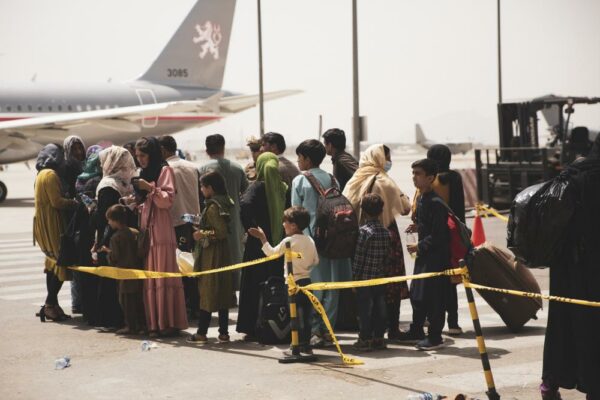
(Updated at 10:50 a.m.) When the U.S. started evacuating Afghan interpreters on July 30, Arlington-based Ethiopian Community Development Council — better known as ECDC — got to work helping them resettle in Northern Virginia.
The organization, founded to help Ethiopians but which has a more global reach today, is one of three agencies authorized to resettle refugees with Special Immigrant Visas in the region.
“The majority of Afghan SIVs, currently, are being placed in the cities of Denver, Silver Spring, Houston, Arlington, and San Diego,” ECDC spokeswoman Emily Gilkinson said. “In the Arlington area, we have received about five to seven SIV holders, along with their families, per week. There have been a few couples or individuals but generally, family sizes range from 4-10 people. They are staying with their U.S. ties, in hotels or Airbnbs until moving into permanent housing.”
The other authorized resettlement agencies in the area include Catholic Charities of the Diocese of Arlington and Lutheran Social Services.
“Catholic Charities resettles the most refugees in the area, followed by LSS, then by ECDC,” said Bryna Helfer, Arlington County’s assistant county manager for communications and public engagement.
Arlington’s branch of Catholic Charities has welcomed more than 2,600 SIV holders to Northern Virginia in the last six years, and resettled 326 SIV holders — most of whom are from Afghanistan — this fiscal year, said Diana Sims Snider, the deputy director of communications for the diocese.
The organization, based in Arlington with migration and refugee offices in Arlington, Manassas, Fredericksburg and Sterling, is one of about 40 Catholic Charities around the country resettling Afghan families, she said.
For the last three weeks, the military has been facilitating flights from Afghanistan’s capital, Kabul, some of which have touched down at Dulles International Airport. Nearly 2,000 Afghan interpreters and other refugees eligible for SIVs have gone to central Virginia’s Fort Lee military base, which is operating as a temporary host facility.
Catholic Charities got to work on July 30, welcoming several planeloads of evacuated Afghan SIV holders at Fort Lee, Snider said.
“Catholic Charities staff provided legal assistance for paperwork completion, translation, child activities, and other essential resources to men, women and children at Fort Lee, Virginia,” she said. “Many of these SIV-holders then traveled on to destinations elsewhere in the U.S. to settle with family already residing in this country. About 35 of those Afghan SIV-holders who came to Fort Lee in August are settling in the Diocese of Arlington.”
The situation has become more dire and unpredictable with the fall of Kabul.
“We receive notification of arrivals only a few days before, and therefore it is very difficult to predict how many we will receive,” Gilkinson said. “We are doing our best to be flexible and responsive to the requests and information whenever it comes, as we recognize the urgency of the situation.”
Video: People run on tarmac of Kabul international airport as a US military aircraft attempts to take off. pic.twitter.com/9qA36HS0WQ
— TOLOnews (@TOLOnews) August 16, 2021
airport update
not 1 of the people I know on the ground got in and made an evac flight.
what’s the point of the airport being operational if no one can get in? and there are no excuses – there are now more troops in Afghanistan than there have been in years. #EvacuateAfghans pic.twitter.com/JWaPVPQtkM
— Arash Azizzada آرش (@87films) August 19, 2021
How to help
ECDC and Catholic Charities both have listed ways that people can help.
“We greatly appreciate the interest that people from the local community have shown in supporting SIVs upon arrival,” Gilkinson said. “Successfully welcoming and integrating these individuals and other refugees escaping similar dangerous situations across the world is something our agency cannot do alone.”
The biggest need for both organizations is housing leads.
“With rent costs extremely high in most U.S. cities and a general shortage of rental properties, our agency is always looking for new landlords that would be willing to rent to individuals in this situation, who don’t have proof of income or rental history,” Gilkinson said.
Helfer said relatively few refugees are resettled in Arlington, due to the high cost of living, but the county will support those who take up residence here.
“If refugees do resettle any in Arlington, our human services department role would be to work with the refugee resettlement agencies to get them a health screening, enroll their kids in public schools, etc.,” she said. “If we can provide wraparound support services (like housing subsidies, food, diapers, etc.), we most certainly will.”
Catholic Charities notes that housing leads in Fredericksburg, Sterling and Woodbridge would allow refugees to be near their relatives. The organization is requesting new household items, available on an Amazon wishlist, as well as new or gently-used furniture. A number of volunteer positions are also available.
In addition to in-kind donations, Gilkinson said ECDC needs monetary donations to “help us to supplement rent and other costs for newcomers after the limited one-time government grant is exhausted and before they become self-sufficient.”
People with more free time can volunteer by mentoring new families, providing job coaching or helping families learn English, she said.
This isn’t the first time Arlington has welcomed refugees fleeing a war involving the U.S.
Clarendon used to be known as Little Saigon because of all of the Vietnamese refugees who settled here and opened businesses in the neighborhood after the fall of Saigon — which has resurfaced as a point of comparison after the chaotic fall of Kabul. As rents rose in the wake of the opening of Metro’s Orange Line, however, the Vietnamese presence faded.

